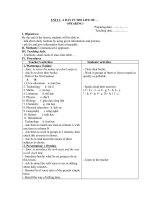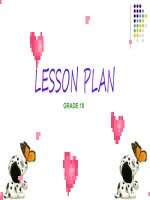5 2 2 a day in the life of peter and eve
Bạn đang xem bản rút gọn của tài liệu. Xem và tải ngay bản đầy đủ của tài liệu tại đây (3.01 MB, 12 trang )
Suggested levels for Guided Reading, DRA,™
Lexile,® and Reading Recovery™ are provided
in the Pearson Scott Foresman Leveling Guide.
A Day in the Life
of Peter and Eve
by Gretchen McBride
illustrated by Ralph Canaday
Genre
Historical
fiction
Comprehension
Skills and Strategy
• Author’s Purpose
• Draw Conclusions
• Monitor and Fix Up
Scott Foresman Reading Street 5.2.2
ISBN 0-328-13520-8
ì<(sk$m)=bdfcac< +^-Ä-U-Ä-U
Reader Response
1. What you do think was the author’s purpose for
writing this book?
A Day in the Life
of Peter and Eve
2. Do you understand how the Karps were able to
leave Germany? Use a chart like the one below to
tell what happened. Reread the story to clarify your
understanding.
by Gretchen McBride
First
illustrated by Ralph Canaday
Next
Then
3. The word cable has many different meanings. What
meaning does it have in this book? (See page 11.)
4. Have friends of yours ever been teased or bullied
because they were different from other people? How
did it make them feel? How do you think it would
make you feel?
Editorial Offices: Glenview, Illinois • Parsippany, New Jersey • New York, New York
Sales Offices: Needham, Massachusetts • Duluth, Georgia • Glenview, Illinois
Coppell, Texas • Ontario, California • Mesa, Arizona
Every effort has been made to secure permission and provide appropriate credit for
photographic material. The publisher deeply regrets any omission and pledges to
correct errors called to its attention in subsequent editions.
In the cool, dark cellar, Peter Kissel’s alarm
clock rang. He silenced it as quickly as he could.
“Wake up, little sister,” he said. In the cot next
to his, Eve was still sleeping. Peter felt sorry for
her. Eve was too young to remember what life
was like before the war.
It was a war that seemed to go on endlessly.
Last night, enemy bombers had flown right over
the roof of their house. The distant boom of their
falling bombs had lasted for a long time.
Peter wished he were still sleeping. He had
been dreaming of frying sausage. The war had
caused food shortages, making meat almost
impossible to find. “Oh, if only Mother were
cooking sausages for breakfast!” Peter thought. He
sniffed hopefully at the air. But all he could smell
was the cellar’s coal dust.
Unless otherwise acknowledged, all photographs are the property of Scott Foresman,
a division of Pearson Education.
Photo locators denoted as follows: Top (T), Center (C), Bottom (B), Left (L), Right (R),
Background (Bkgd)
Illustrations by Ralph Canaday
Photograph 20 Keystone/Getty Images
ISBN: 0-328-13520-8
Copyright © Pearson Education, Inc.
All Rights Reserved. Printed in the United States of America. This publication is
protected by Copyright, and permission should be obtained from the publisher
prior to any prohibited reproduction, storage in a retrieval system, or transmission
in any form by any means, electronic, mechanical, photocopying, recording, or
likewise. For information regarding permission(s), write to: Permissions Department,
Scott Foresman, 1900 East Lake Avenue, Glenview, Illinois 60025.
2 3 4 5 6 7 8 9 10 V0G1 14 13 12 11 10 09 08 07 06 05
3
“At least,” Peter thought to himself, “I still
have my jar of apple butter.” He imagined
spreading the jar’s delicious contents on some
fresh bread. Fresh bread, like meat, was difficult
to find in the stores.
The apple butter had been made by Peter’s
mother, using apples, sugar, and spices. She had
given him the jar on his last birthday. Peter had
decided to save it for when his brother Carl and
his father came home. Carl was a soldier fighting
in the war. Papa had to live in a town far away so
that he could help make trucks for the war.
4
“It’s so dark in here,” Eve groaned. The
morning light barely entered the gloomy cellar.
The cellar was gloomy for a reason. Before
Papa had moved away, the rest of the family had
made an agreement with him to stay safe from
the enemy bombers by sleeping in the cellar.
Papa did not want the enemy planes to see any
light from the house. So together with Peter he
had covered the cellar window with dark cloth.
They had also tied bundles of rags and old
newspapers to the window, so it wouldn’t rattle
when the planes flew overhead.
The Kissel family lived an hour’s train ride
away from Berlin, the capital of Germany. The
planes flew over their little town on their way
to bomb the capital. The townspeople could
see the flash of the bombs exploding in Berlin.
Sometimes they made the ground shake.
5
“Peter, Eve, breakfast!” Mama called from
upstairs. Peter knew there wouldn’t be any
sausage. Still, he kept his hopes up. Maybe his
mother had been able to get some fresh bread!
But there was only yesterday’s bread with the
butter substitute that Peter hated.
“Mama, Herr Braun has six dairy cows.
Can’t we buy butter from him?” Peter asked.
(Herr is the German word for “mister.”)
“Only the soldiers get butter,” Mama said.
“Carl is a soldier. Do you think he’s been
lucky enough to have butter?” Eve asked.
“I hope so,” her mother replied softly.
After breakfast, Peter and Eve walked to
school. The schoolyard was filled with shouting
and running children. When the headmaster
appeared on the steps of the building, everyone
fell silent and formed orderly lines. Peter
watched his little sister line up with the youngest
girls as he joined a line of older boys.
6
Fräulein Mann was Peter’s teacher. (Fräulein
means “miss” in German.) Peter worried about
his teacher. She often looked sad and tired. Her
dresses were faded, and Peter could see where
she had been forced to mend them.
Wringing her hands, Fräulein Mann rose
to speak. “Today,” she began, “I am pleased
to introduce to you two of our town council
representatives, Herr Meitzel and Herr Lutz.
They will be speaking to us about our duty to
Germany in this terrible time of war.”
7
“Heil Hitler!” Herr Meitzel shouted, raising
his arms and clicking his heels. This was a salute
to Adolf Hitler, the ruler of Germany. Herr
Meitzel looked at their teacher expectantly.
“Heil Hitler,” Fräulein Mann said softly. Peter
could tell that she disliked giving the salute.
“Boys and girls, I am here to warn you
about a terrible danger,” Herr Meitzel began.
“There are those living among us who are not
true Germans,” he said, narrowing his eyes.
“I’m talking about Jewish people, boys and
girls. Beware! Might someone you know be a
Jewish person who is pretending to be German?
It is your duty to turn them in! Herr Lutz will
now tell you how to stay safe from the Jews,
and others who would destroy our beloved
Fatherland.”
8
“Perhaps,” Herr Lutz began in a hushed tone,
“you have neighbors who have opened their
home to refugees. But how could you tell if those
refugees are true Germans, like you and me? I
have here a copy of a letter written in secret by a
refugee who is pretending to be a real German.
Our experts have translated it from a language
used by our enemies. ‘My friends,’ the letter
begins, ‘these fools feed me well with meat and
sweets while I steal their money and learn their
secrets.’ Imagine, boys and girls, these enemies
are eating your sweets while they laugh at you!
Be watchful. Tell us whom you suspect. We will
report to our superiors, and action will be taken!
You could be a hero, like a soldier!”
9
With that, Herr Lutz and Herr Meitzel left.
The room was quiet. Peter thought of his old
friend, Hans Karp. Life in Germany had been
difficult for the Karps, because they were Jews.
Peter remembered the night a mob threw rocks
through the windows of their house and painted
terrible words on their front door. When Peter
asked his mother why this had happened, she
said that Hitler was telling the German people
that Jewish people were to blame for all of
Germany’s problems. Peter’s mother warned him
not to believe this.
10
Not long after their windows were broken,
Hans and his family left Germany, through
the help of Fräulein Mann’s cousin, Thomas.
Thomas had once been a diplomat stationed in
England. Just before England declared war on
Germany, he was able to persuade the British
government to issue a visa, or special pass, that
would let the Karps travel to England. Then he
sent a cable to the Karps, saying that they had
permission to enter England. Right after that
the Karps disappeared, without anyone hearing
if they had safely arrived in England. Peter’s
parents told him not to ask any questions about
the Karps’s disappearance.
“School is now over, class,” Fräulein Mann
said. Peter snapped out of his daydream. It was
time to go home!
11
Peter and Eve walked home from school.
When they got home they found their mother
standing in the kitchen, reading a piece of paper.
It was a letter from Carl! Their mother ladled
out some soup for herself and her children. Then
she began reading the letter aloud.
12
September 21, 1944
Dear Family,
Now that I am stuck here in a field hospital, I at
last have time to write. Don’t worry, I haven’t been
wounded. The truth is I have been made sick by a terrible
stomachache. Oh, if only it had come from eating too many
of your wonderful ginger cookies, Mama! But the doctors
say that it came from eating spoiled food. They say that I
will soon be well enough to return to my unit.
Peter, when we last saw each other, you said that you
hoped the war would last long enough for you to march
into battle. I admire your courage, Peter, but you must not
wish for such a thing. Instead, all of you, please hope for
a quick end to all the fighting.
There is a small chance that the army will allow me
to return home for a visit. If I get a chance to do so, I will
send a letter.
Love,
Carl
13
“Won’t your father be happy to hear about
Carl’s letter?” Peter and Eve’s mother said, while
wiping tears of joy from her eyes.
Eve, Peter, and their mother talked about
what they would tell Carl in their next letter.
“We must make sure to tell him about the jar of
apple butter I am saving for him!” Peter said.
The family sat down to eat their soup. Eve
mentioned, “Mama, today some men from the
town council came to talk to us. They said there
might be Jewish people hiding in our town and
that it was our job to report on them. Why are
Jewish people bad, Mama?” Eve asked.
14
Peter saw his mother glance over her
shoulder at the open kitchen window. She looked
nervous. “Let’s talk about this when we are safe
in the cellar and preparing for bed,” she said,
leaning close to her daughter. “I don’t want our
neighbors to hear us talking,” she added.
“Mama, do we have to sleep in the cellar
again?” Eve asked.
“Yes, we’ll be safer there if a bomb falls near
us,” her mother answered. “Now go play in the
garden while there is still a little light.”
15
Peter watched his sister skip out into the
garden. “I don’t care if Hans Karp was Jewish. I
know that he was not bad, Mama,” he said softly.
“You’re right, but we can’t talk about that
now,” his mother responded.
Later, when Peter and Eve were in the cellar
with their mother, the family talked quietly.
“When your father fought in the war years
ago, do you know who fought beside him?” their
mother asked.
16
“Hans’s father, Herr Karp,” Peter said.
“Yes, and do you know what Herr Karp did?
When your father was wounded in the trenches,
Herr Karp saved his life. Herr Karp is Jewish,
and he fought heroically for Germany. But the
Nazis still forced him to leave the country.”
“Mama,” Eve asked, “are we Nazis?”
“No,” her mother replied, “Not all Germans
are Nazis. But the Nazis run Germany. They
are bad people. They make me ashamed of our
country.”
Peter added, “Eve, you’re too young to
remember this, but Hans Karp used to be my
best friend. I miss him very much.”
Eve looked confused. “Peter, you and Mama
say the Karps were good people. So why did
Herr Lutz and Herr Meitzel say that we need to
stay safe from Jewish people?”
17
“They say that because the Nazis order them
to,” their mother explained. She added, “Some
of them believe what they say. Others are afraid
that the Nazis will hurt them if they don’t say
those things.”
“But, Mama, shouldn’t we tell the people who
say these terrible things that they are wrong?”
Eve asked.
“I wish you could, Eve. But the Nazis would
hurt you for saying so. Still, you may tell or
ask me anything you want, but only here in the
cellar, in whispers,” her mother said.
Eve nodded solemnly. Her mother continued.
“There are other people in our town who think
like we do. They are helping Jewish families
get away from the Nazis. Would you give up
something to help them?”
18
“Like what?” Peter asked.
“There’s that apple butter you’ve been saving
for Carl and Papa. Would you give it to Jewish
families who need it more?” Mother asked.
“Of course, but how will we get it to them?”
Peter wondered.
“Take it to school with you tomorrow and
give it to Fräulein Mann. She knows people who
help the Jewish people who are in hiding. Say
that it is a present from your mother, and she will
understand. Now before we fall asleep tonight,
let us hope for an end to this terrible war.”
Peter looked into the darkness. Soon, he
hoped, the Nazis would lose the war. Then good
people like the Karps could come back home
again, and Mama would no longer have to be
ashamed of their country.
19
Hitler Youth
Reader Response
The Hitler Youth was founded by Adolf Hitler in 1933, the
year he seized power in Germany. It was founded to ensure
that German boys grew up learning to be loyal to Hitler over
everyone else. In 1936 it was made law that all non-Jewish
German boys join the Hitler Youth. Membership in the Hitler
Youth lasted for five years, from ages thirteen to eighteen. Upon
turning eighteen, children in the Hitler Youth graduated to
become members of the Nazi Party. Their participation in
the Hitler Youth ended officially at age twenty-one, after they
had completed three years of service with the German military.
Hitler Youth members were taught never to question
Hitler, and to obey the commands of his Nazi Party without
fail. They were told to report back to their leaders about
anyone who criticized Hitler or the Nazi Party.
1. What you do think was the author’s purpose for
writing this book?
2. Do you understand how the Karps were able to
leave Germany? Use a chart like the one below to
tell what happened. Reread the story to clarify your
understanding.
First
Next
Then
3. The word cable has many different meanings. What
meaning does it have in this book? (See page 11.)
4. Have friends of yours ever been teased or bullied
because they were different from other people? How
did it make them feel? How do you think it would
make you feel?
Adolf Hitler reviewing children at a Hitler Youth rally.
20









